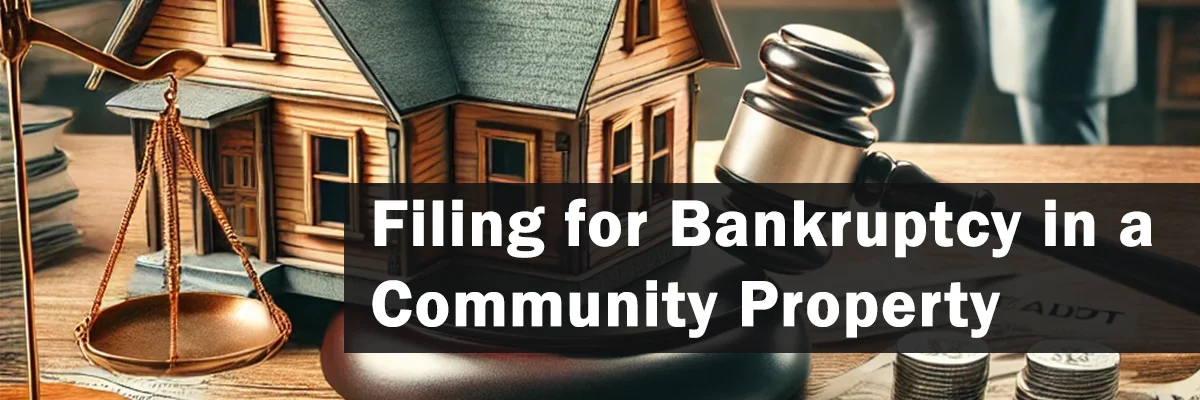Filing for Bankruptcy in a Community Property State Like Arizona
Filing for bankruptcy is a significant decision that can have long-term financial and legal consequences. For residents of Arizona and other community property states, the bankruptcy process is further complicated by the unique nature of community property laws. Understanding how these laws affect bankruptcy filings is essential to navigating the process effectively and protecting your financial interests.
Understanding Community Property in Arizona
Arizona is one of a handful of states that follows a community property system. Under Arizona law, most property and debts acquired by either spouse during the marriage are considered community property, meaning they are jointly owned by both spouses. This principle applies regardless of which spouse earned the income or whose name is on the title or account.
Community property includes:
- Wages earned by either spouse during the marriage
- Property purchased with those wages
- Debts incurred during the marriage for the benefit of the community
Separate property, on the other hand, includes property owned by either spouse before the marriage, inheritances, and gifts received by one spouse individually. However, separate property can lose its status and become community property if it is commingled with community assets.
How Community Property Affects Bankruptcy Filings
When one spouse files for bankruptcy in Arizona, the treatment of community property and debts is different than in common law states. Below are key considerations for bankruptcy in a community property state:
1. Community Property and the Bankruptcy Estate
In a Chapter 7 or Chapter 13 bankruptcy, the bankruptcy estate includes the debtor’s separate property and all community property. This means that even if only one spouse files for bankruptcy, all community property is subject to the bankruptcy process.
- If one spouse files for bankruptcy, the filing protects the couple’s community property from creditors, even those creditors of the non-filing spouse.
- Separate property of the non-filing spouse is generally not part of the bankruptcy estate and is not subject to liquidation.
2. Community Debt Discharge
In a Chapter 7 bankruptcy, when one spouse receives a discharge, it typically eliminates the couple’s community debt, not just the debts of the filing spouse. This is known as the “community discharge.”
- Creditors cannot pursue community property for discharged debts, even if the non-filing spouse remains legally liable for the debt under state law.
- However, the non-filing spouse’s separate property may still be subject to collection efforts for individual debts.
3. Impact on the Non-Filing Spouse’s Credit
A common concern is whether the bankruptcy filing of one spouse will negatively affect the other spouse’s credit. In Arizona, the bankruptcy filing itself will not appear on the non-filing spouse’s credit report. However, if joint debts are discharged or included in the bankruptcy, that may impact the non-filing spouse’s credit score.
4. Filing Jointly vs. Separately
Married couples in Arizona have the option to file for bankruptcy jointly or separately. Filing jointly may be beneficial if both spouses have significant debt or if the goal is to protect more community property. However, there may be strategic reasons to file separately, such as preserving the separate property of the non-filing spouse or minimizing the impact on the other spouse’s credit.
Exemptions in Arizona Bankruptcy Cases
Arizona has its own set of bankruptcy exemptions, which determine what property can be protected from liquidation. Common exemptions include:
- Homestead exemption – up to $415,000 of equity in a primary residence
- Personal property – up to $16,000 in household goods and furnishings
- Vehicle exemption – up to $16,000 in equity for a motor vehicle ($25,000 if the debtor or a dependent is disabled)
- Wages – up to 90% of disposable weekly earnings or 30 times the federal minimum wage, whichever is greater
Importantly, these exemptions apply to both separate and community property. This means that filing bankruptcy may allow the couple to protect a substantial portion of their community property from creditors.
Considerations for Chapter 7 vs. Chapter 13 Bankruptcy
The choice between Chapter 7 and Chapter 13 bankruptcy depends on the debtor’s income, assets, and financial goals:
- Chapter 7 Bankruptcy – Also known as “liquidation bankruptcy,” Chapter 7 allows for a discharge of most unsecured debts within a few months. In a community property state, the discharge protects both the filing spouse and the non-filing spouse’s interest in community property.
- Chapter 13 Bankruptcy – Also known as a “reorganization bankruptcy,” Chapter 13 involves creating a repayment plan over three to five years. This may be a preferable option for debtors who want to protect non-exempt property or prevent foreclosure.
Key Takeaways
Filing for bankruptcy in Arizona, a community property state, introduces unique legal complexities. While filing for bankruptcy can protect community property and provide relief from creditors, it also impacts both spouses’ financial positions, even if only one spouse files. Understanding the nuances of community property law is essential for making informed decisions about bankruptcy.
Consulting with an experienced bankruptcy attorney familiar with Arizona law is critical to ensuring that your rights and assets are protected throughout the bankruptcy process. Careful planning and legal guidance can help you navigate the complexities of community property and bankruptcy and achieve the best possible financial outcome.


